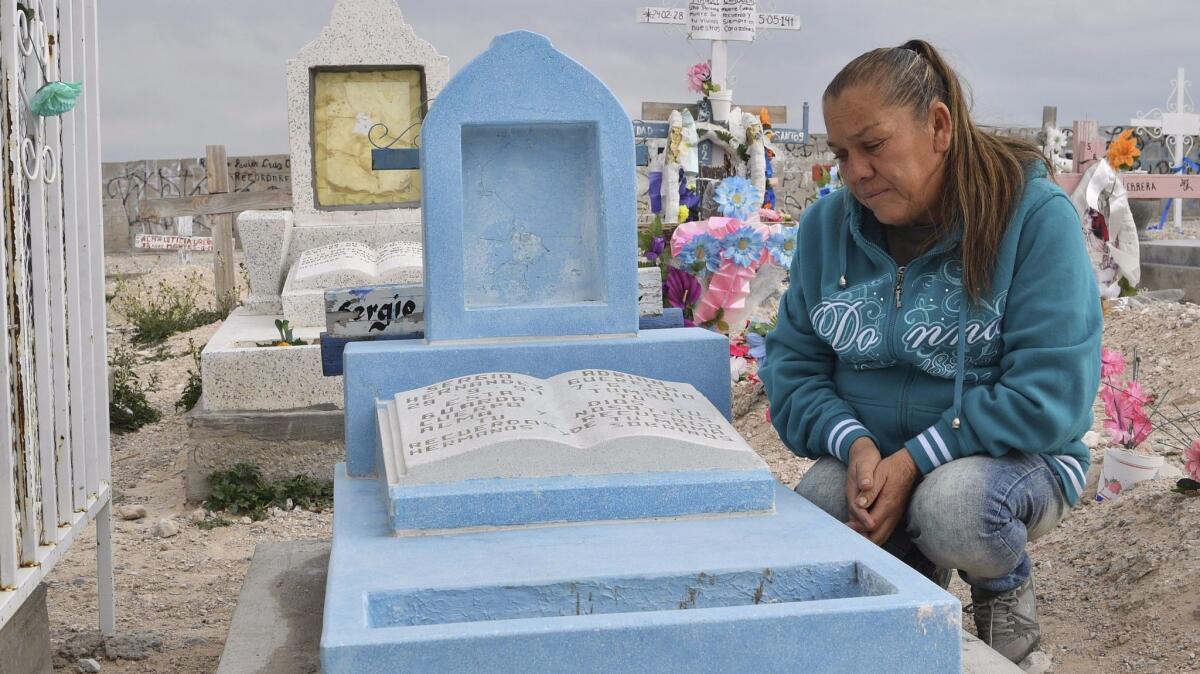Supreme Court justices appear split over whether Constitution extends to Mexican teenager shot across the border

Reporting from Washington — Supreme Court justices debated border shootings and drone strikes Tuesday in a case that could preview the legal battle over President Trump’s proposed ban on foreign travelers from certain Muslim-majority countries.
But the eight justices sounded evenly split over whether the parents of a Mexican teenager can sue the U.S. border agent who shot and killed him as he stood on the Mexican side of the border.
At issue is whether the Mexican family can invoke the Constitution’s protections against excessive force and for due process of law to restrain the conduct of the American agent, or whether U.S. law stops at the border.
A barrage of rocks and then bullets: When the Border Patrol kills Mexican teens »
In suits contesting President Trump’s now-frozen travel ban, lawyers have claimed the executive order violates the due process rights of foreign travelers, some of who are in this country and others who have never been here. Government lawyers say constitutional protections do not extend to foreigners who are not in this country.
Robert Hilliard, attorney for the parents of 15-year-old Sergio Hernandez, said the victim was “barely across the border, unthreatening and unarmed” when agent Jesus Mesa shot him from across the concrete culvert that separates El Paso, Texas from Juarez, Mexico.
“All conduct of the domestic police officer happened inside the United States,” he said. And the question at issue “is one of the most fundamental rights: the right to life,” he added, urging the justices to allow the suit to proceed.
But the court’s conservatives, led by Chief Justice John G. Roberts Jr., said they were wary of extending constitutional protections beyond the nation’s borders. What about a “drone strike in Iraq where the plane is piloted from Nevada?” he asked. “Why wouldn’t the same analysis apply in that case?”
Because the military is different, Hilliard replied. He described the U.S. Border Patrol as the nation’s largest civilian police force, and said the lawsuit “addresses the ongoing problem along the southwest border that has resulted in at least 10 cross-border shootings and six Mexican national deaths.”
But Justice Anthony M. Kennedy said he too is wary of allowing U.S. courts to decide such cases.
“This is one of the most sensitive areas of foreign affairs where the political branches should discuss with Mexico what the solution ought to be,” Kennedy said. “Isn’t this an urgent matter of separation of powers for us to respect the duty… that the executive and the legislative have with respect to foreign affairs?”
Without Kennedy’s vote, the parents have little chance to win.
Randolph Ortega, a lawyer for Mesa, insisted the suit should be thrown out because the shooting victim was on the Mexican side. “The border is very real,” he said.
He was supported by Deputy Solicitor Gen. Edwin Kneedler, arguing on behalf of the U.S. government. He also urged the court not to allow legal claims for “an injury outside the United States. The two nations have drawn a line” at the border, he said, and the protections of U.S. law stop there.
Meanwhile, the court’s four liberals, led by Justice Ruth Bader Ginsburg, leaned in favor of allowing the border agent to be sued for wrongful shooting.
Ginsburg argued forcefully that it was a mistake to focus on the Mexican border rather than on the conduct of the border agent. She said the law of the United States governs the case and the conduct of the agent. “And the instruction from the United States is very clear: Do not shoot to kill an unarmed, non-dangerous person who is no threat to your safety. Do not shoot to kill,” she said. “That’s U.S. law…. So I don’t understand all this about Mexico. It’s about the United States law operating on the United States official who is acting inside the United States.” .
Justice Sonia Sotomayor was quick to agree. Surely the U.S. government is not “condoning people standing at the border and taking potshots at passing Mexicans,” she said.
At one point, Kennedy cited Ginsburg’s comments and appeared to agree. “It’s a U.S. officer subject to U.S. supervision. That’s it,” he told Mesa’s lawyer.
The justices will meet later this week to discuss the case and cast their votes in Hernandez vs. Mesa. If they were to follow the approach set out by Ginsburg, they could rule the border agent is subject to suit because he violated the Constitution when he fired the shots that killed the Mexican teenager. If so, such a ruling could prove significant in the years ahead because it could mean the constitutional limits are binding on U.S. immigration agents, even if they were dealing with noncitizens who are at the borders.
However, if the justices were to split 4-4, they could dismiss the case on an evenly divided vote. That would end the parents’ lawsuit because the lower court’s ruling against the family would stand. However, the justices could choose to hold the case until a ninth justice arrives, mostly likely in two months.
To read this article in Spanish, click here.
On Twitter: DavidGSavage
ALSO:
A view from New York: Arab Americans work out travel plans as U.S. sorts out Trump’s ban
Here’s what’s driving lawmakers working to legalize recreational pot in 17 more states
Milo Yiannopoulos resigns from Breitbart News after critics say his comments endorsed pedophilia
More to Read
Get the L.A. Times Politics newsletter
Deeply reported insights into legislation, politics and policy from Sacramento, Washington and beyond. In your inbox three times per week.
You may occasionally receive promotional content from the Los Angeles Times.











